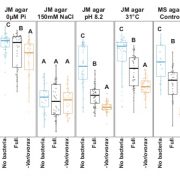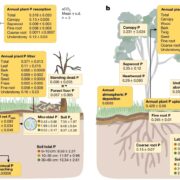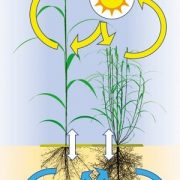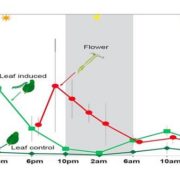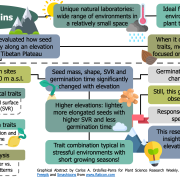Forests endure as critical carbon sinks
 The global forest carbon sink is vital for mitigating climate change by absorbing CO2 and offsetting nearly half of fossil-fuel emissions. Over the past three decades, this sink has remained stable with minor fluctuations, but its future is threatened by deforestation, forest ageing, and climate change. Pan et al. conducted a comprehensive analysis using ground-based forest data from boreal, temperate, and tropical biomes. They found that the global forest carbon sink’s stability masks regional variations: temperate and tropical regrowth forests have increased carbon uptake, while boreal and tropical intact forests have declined. Boreal forests’ carbon sink has diminished due to intensified disturbances like wildfires and insect outbreaks. In contrast, temperate forests have increased their carbon sequestration due to extensive afforestation and reforestation, particularly in China. Tropical regrowth forests, which have expanded on previously agricultural lands, also significantly contribute to carbon sequestration. The study highlights the need for effective land management policies to limit deforestation, promote forest restoration, and improve timber-harvesting practices to protect and enhance the forest carbon sink. Ensuring the resilience of this critical climate mitigation tool requires continued investment in forest monitoring and research. (Summary by Amarachi Ezeoke) Nature 10.1038/s41586-024-07602-x
The global forest carbon sink is vital for mitigating climate change by absorbing CO2 and offsetting nearly half of fossil-fuel emissions. Over the past three decades, this sink has remained stable with minor fluctuations, but its future is threatened by deforestation, forest ageing, and climate change. Pan et al. conducted a comprehensive analysis using ground-based forest data from boreal, temperate, and tropical biomes. They found that the global forest carbon sink’s stability masks regional variations: temperate and tropical regrowth forests have increased carbon uptake, while boreal and tropical intact forests have declined. Boreal forests’ carbon sink has diminished due to intensified disturbances like wildfires and insect outbreaks. In contrast, temperate forests have increased their carbon sequestration due to extensive afforestation and reforestation, particularly in China. Tropical regrowth forests, which have expanded on previously agricultural lands, also significantly contribute to carbon sequestration. The study highlights the need for effective land management policies to limit deforestation, promote forest restoration, and improve timber-harvesting practices to protect and enhance the forest carbon sink. Ensuring the resilience of this critical climate mitigation tool requires continued investment in forest monitoring and research. (Summary by Amarachi Ezeoke) Nature 10.1038/s41586-024-07602-x



